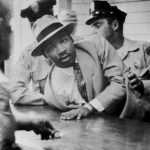As a Mexican-American leader, I offer my deepest condolences to the Martin family for the tragic loss of their son. As a father of two mixed race sons (Latino and White, like George Zimmerman), my heart is broken for everyone involved. I am most saddened by the prospects of greater racial unrest and by the painful reality that we still have so much work to do to uproot both racism and poverty in our country. I am struck that if we are ever going to move past our current divisions and injustices, that we must be brutally honest about our current reality. Part of this is the long history of racial oppression for people of color.
One of the most vivid memories of my childhood was taking long walks with my grandfather in Mexico to buy garlic and beans. My grandfather would take me by the hand and would often whisper to me in Spanish, “You have to be careful with the Bolillos, because they’re going to take advantage of you.” Bolillo is a slang word for Anglo, which literally means a small roll of white bread.
Because my grandfather had grown up living in a time when Mexicans could not use White bathrooms and where the Mexican workers were often abused and taken advantage of, he felt it his obligation to school me on the truths of race dynamics, even at an early age.
I wish I could say that those early experiences did not mark my perception of White folks, but I am certain they did. Not only did my grandfather’s words impact my perspective, but many personal experiences as a Mexican-American minority (not only in Texas, but even in a more progressive and diverse California), led me to conclude as a young man that our race matters – in terms of how we are treated and perceived by the dominant culture.
“..our nation still struggles with issues of racism that must not be ignored if we are going to continue to make progress.”
The actuality today is that, as we approach the 50th anniversary of the ‘I Have a Dream’ speech given by Dr. Martin Luther King in Washington DC, most African-Americans are still waiting for the day when they will be judged and treated more by the content of their character, than by the color of their skin. While we acknowledge that much progress has been made related to race, we must conclude that our nation still struggles with issues of racism that must not be ignored if we are going to continue to make progress.
In a very powerful moment, our nation’s first African-American President recently spoke from his heart to express the pain and sentiments of the African-American community trying to deal with what seems like another blow to the idea of justice for all in the wake of the Zimmerman verdict. His giving a voice to the fact that young African-American men are not only vulnerable in the streets of our inner-cities but in the courthouses as well, causes great lament in the hearts of many who care about our nation’s future.
The devastating results of becoming a nation of haves and have-nots, mostly divided along racial lines, perpetuates a legacy of racial injustice that can more accurately be described as a nightmare, especially for African-Americans, than anything close to resembling the dream that Dr. Martin Luther King Jr. articulated.
The Trayvon Martin tragedy provides yet another opportunity for our nation to speak and deal honestly with the complicated and emotionally charged issues that have been raised in the last few weeks. My fear is that all Americans, and more tragically the church, will shamelessly retreat to pursue the status-quo activities of organized and respectable religiosity instead of sacrificially engaging in the work of binding up the suffering of the broken-hearted and seeking the release of our neighbors who are being held captive by violence and economic despair.
“…we too often sit on the sidelines without getting personally involved.”
The truth is, the church is not fully engaged in confronting systemic injustice to address oppression that destroys lives and entire communities. Instead, we too often sit on the sidelines without getting personally involved. Worse, there is minimal organizational investment by our churches, which instead opt to spend millions on buildings and programs for our own comfort and edification, while throwing crumbs to the poor. Instead of working seriously to transform our most vulnerable communities by creating jobs and investing in rebuilding neighborhoods from within these communities, we argue about whether this kind of activity detracts us from the real Gospel-centered work of telling people about Jesus.
Tragically, we truncate the Good News of the Kingdom in such a way that the widow, the orphan, and the stranger are nowhere near the center of our monetary investment or our ministry concern.
At this moment in our nation’s history, I absolutely believe it is time for those of us committed to the Biblically-based philosophy of Christian Community Development to lean into the pain and discontent of our nation and of our under-resourced communities, to provide courageous leadership that will manifest fresh expressions of God’s deep concern for the vulnerable in our society!
With new determination we must declare and demonstrate with our actions that it’s a new day demanding new solutions and a deeper commitment to heal the wounds of racism. It’s a new day to fully engage in the work of making vulnerable neighborhoods whole. It’s a new day to move from status-quo responses and simplistic slogans to root-cause solutions, demanding a new level of sacrificial engagement alongside those on the margins of our nation’s most vulnerable communities, not to solve problems for others but to work together to address our most pressing issues. Regrettably, this call to address racism and poverty, at its core, has been ignored by the church in general, and by Evangelicals in particular in my lifetime, but it is time for us to change this reality.
“…Christ’s love has the power to bring about personal transformation in all of our hearts and in our communities.”
In less than two months, CCDA will convene close to 3,000 leaders from across our nation that deal with the actualities of racial inequality, systemic injustice, economic despair, and familial brokenness up close and personal. Many of our leaders have voluntarily made a commitment to stay in less than thriving neighborhoods to be agents of hope and to cultivate change and healing. Others, burdened by the call to invest their lives in vulnerable neighborhoods, have planted themselves and their families alongside local residents to engage in the long and hard work of tearing down walls of racial strife and separation. Together, many of us have been toiling for years to be agents of God’s Kingdom, believing that Christ’s love has the power to bring about personal transformation in all of our hearts and in our communities.
For such a time as this, I am convinced that our hour has arrived to fully embrace the vision that Dr. John Perkins has been proclaiming and living for over 50 years, to become the restorers of broken walls that will not only change lives and neighborhoods but that will bring honor and glory to God.
Much Love,
Noel Castellanos
CEO





